
The Winter Wonderland of Pyeongchang Ski Resorts
Discover the ultimate winter escape at Pyeongchang Ski Resorts, where world-class skiing meets stunning landscapes and rich Korean culture.
Nestled in the rugged mountains of South Korea, Pyeongchang Ski Resorts offer an unparalleled winter sports experience. Famous for hosting the 2018 Winter Olympics, these resorts have world-class facilities that cater to both beginners and experienced skiers. The snowy slopes are complemented by stunning winter landscapes, providing a perfect backdrop for a memorable holiday. In addition to skiing and snowboarding, Pyeongchang offers a variety of other activities such as snowshoeing, sledding, and ice fishing. For those who prefer a more relaxed experience, the area features numerous hot springs and spas where you can unwind after a day on the slopes. The local cuisine, rich in flavors and tradition, is another highlight, offering everything from hearty Korean BBQ to the unique tastes of traditional mountain dishes. Pyeongchang is not just about winter sports. The region is also home to several cultural attractions, including ancient temples and vibrant festivals that showcase Korean heritage. The blend of natural beauty, adventure, and culture makes Pyeongchang Ski Resorts a must-visit destination for anyone looking to experience the best of winter in South Korea.
Local tips in Pyeongchang Ski Resorts
- Visit during the winter sports season from December to March for the best skiing conditions.
- Book accommodations well in advance, as rooms fill up quickly during peak season.
- Try local delicacies like Hwangtae (dried pollock) and Makguksu (buckwheat noodles) for an authentic culinary experience.
- Consider purchasing a ski pass that includes multiple resorts to explore different slopes.
- Check out the nearby Alpensia and Yongpyong resorts for additional activities and dining options.
The Winter Wonderland of Pyeongchang Ski Resorts
Nestled in the rugged mountains of South Korea, Pyeongchang Ski Resorts offer an unparalleled winter sports experience. Famous for hosting the 2018 Winter Olympics, these resorts have world-class facilities that cater to both beginners and experienced skiers. The snowy slopes are complemented by stunning winter landscapes, providing a perfect backdrop for a memorable holiday. In addition to skiing and snowboarding, Pyeongchang offers a variety of other activities such as snowshoeing, sledding, and ice fishing. For those who prefer a more relaxed experience, the area features numerous hot springs and spas where you can unwind after a day on the slopes. The local cuisine, rich in flavors and tradition, is another highlight, offering everything from hearty Korean BBQ to the unique tastes of traditional mountain dishes. Pyeongchang is not just about winter sports. The region is also home to several cultural attractions, including ancient temples and vibrant festivals that showcase Korean heritage. The blend of natural beauty, adventure, and culture makes Pyeongchang Ski Resorts a must-visit destination for anyone looking to experience the best of winter in South Korea.
When is the best time to go to Pyeongchang Ski Resorts?
Iconic landmarks you can’t miss
Monapark Yong Pyong Ski Resort
Experience the thrill of winter sports at Monapark Yong Pyong Ski Resort, the premier destination for skiing, snowboarding, and family fun in South Korea.

Phoenix Pyeongchang Hotel
Experience luxury and adventure at Phoenix Pyeongchang Hotel, your perfect retreat for skiing, golfing, and family fun in the heart of Gangwon-do.

Holiday Inn & Suites Alpensia Pyeongchang, an IHG Hotel
Experience the perfect blend of comfort and adventure at Holiday Inn & Suites Alpensia Pyeongchang, your gateway to stunning mountain landscapes and exciting winter sports.
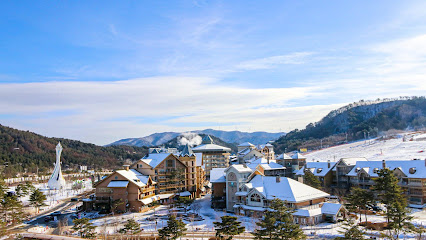
InterContinental Alpensia Pyeongchang Resort
Experience luxury and adventure at InterContinental Alpensia Pyeongchang Resort, the gateway to South Korea's breathtaking landscapes.
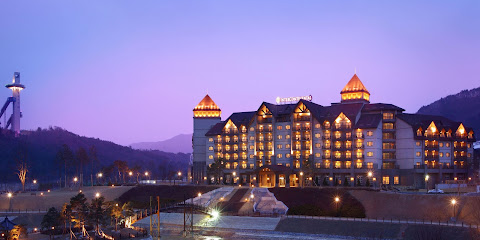
Hanwha Resort Pheonix Park
Discover the tranquil beauty and adventurous spirit of Hanwha Resort Pheonix Park, a premier destination for relaxation and outdoor activities in Gangwon-do.

RAMADA Hotel & Suites Gangwon PyeongChang
Discover the luxurious comfort of RAMADA Hotel & Suites in PyeongChang, your gateway to thrilling outdoor adventures and relaxation in nature's embrace.

Alpensia Ski Resort
Discover the thrill of winter sports at Alpensia Ski Resort, where breathtaking slopes and stunning landscapes combine for an unforgettable adventure in Pyeongchang.
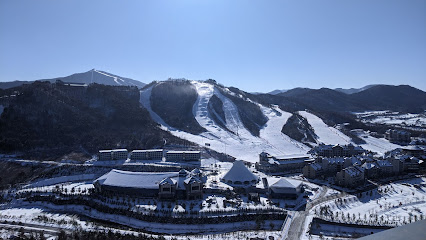
Dragon Valley Hotel - Yongpyeong Resort
Discover the charm of Dragon Valley Hotel at Yongpyeong Resort, where adventure meets comfort in the heart of Korea's first ski resort.

Phoenix Pyeongchang Resort
Experience the thrill of adventure and the serenity of nature at Phoenix Pyeongchang Resort, a premier destination for all seasons in South Korea.

Odaesan National Park
Explore the breathtaking landscapes, rich biodiversity, and serene temples of Odaesan National Park, a must-visit destination in Gangwon-do, South Korea.
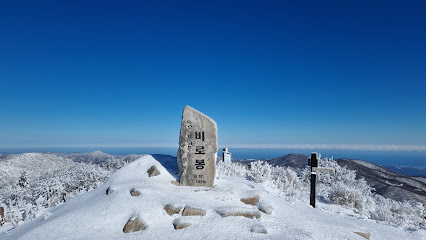
Bliss Hill Stay - Yongpyeong Resort
Discover Bliss Hill Stay at Yongpyeong Resort, your perfect getaway in Gangwon-do, where adventure meets relaxation amidst stunning natural beauty.

Yongpyeong Ski Resort
Experience the thrill of winter sports at Yongpyeong Ski Resort, Pyeongchang's premier destination for skiing, snowboarding, and breathtaking mountain views.
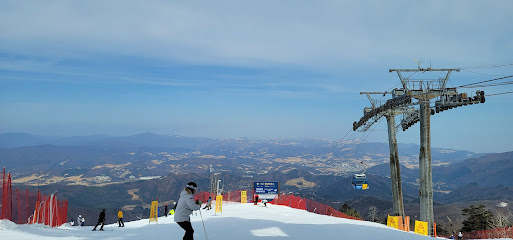
Phoenix Pyeongchang Snow Park
Discover the ultimate winter adventure at Phoenix Pyeongchang Snow Park, a premier ski resort in South Korea's stunning Gangwon-do region, perfect for all skill levels.
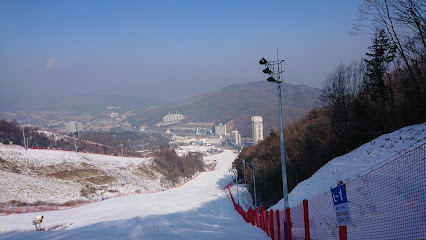
Hoengseong Welli Hilli Park Ski Resort
Explore the stunning slopes of Hoengseong Welli Hilli Park Ski Resort, where thrilling winter adventures meet breathtaking landscapes in Gangwon-do, South Korea.
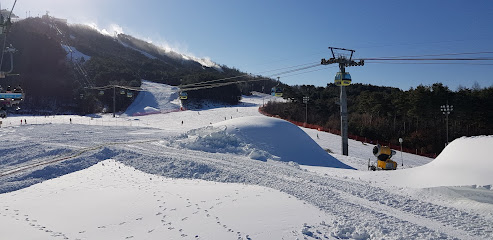
레인보우 3
Discover the thrilling slopes and stunning landscapes of Pyeongchang Ski Resort, a winter paradise for skiing and adventure in South Korea's Gangwon-do region.

Unmissable attractions to see
Gyeongpo Beach
Explore the stunning Gyeongpo Beach in Gangwon-do, where golden sands meet crystal-clear waters, perfect for relaxation and adventure.
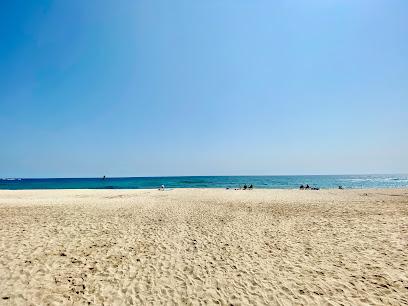
Daegwallyeong Sheep Farm
Discover the charm of Daegwallyeong Sheep Farm in Pyeongchang-gun, a picturesque escape with friendly sheep and stunning mountain views.
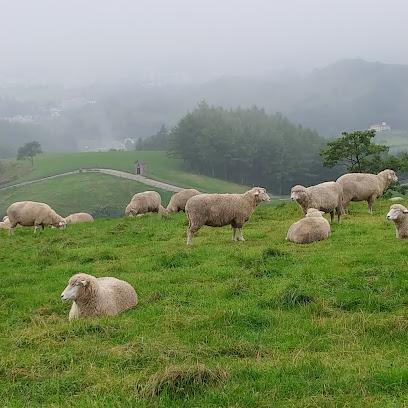
Eco Green Campus [Daegwallyeong Samyang Ranch]
Experience the breathtaking beauty and tranquility of Daegwallyeong Samyang Ranch, a top destination for nature lovers in Pyeongchang, South Korea.
![Eco Green Campus [Daegwallyeong Samyang Ranch]](https://evendo-location-media.s3.amazonaws.com/AttractionImages/9d7c040a-f91b-4d52-b62a-871745199aec)
Balwangsan Skywalk
Experience stunning panoramic views from Balwangsan Skywalk, an architectural marvel in Pyeongchang's breathtaking landscape, perfect for nature lovers and adventurers.
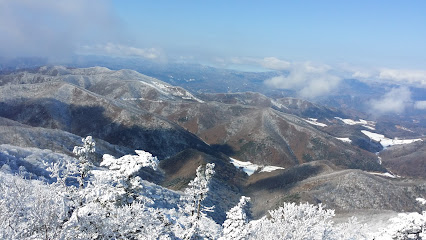
Drama 'Dokkaebi' Filming location
Discover the scenic filming location of the hit drama 'Dokkaebi' and immerse yourself in the magic of Korean culture amidst breathtaking landscapes.
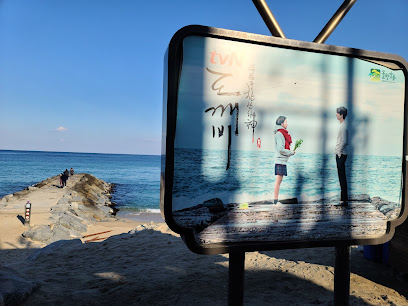
Ari Hills Resort Skywalk Observatory
Discover breathtaking views and serene landscapes at the Ari Hills Resort Skywalk Observatory in Gangwon-do, a top tourist attraction in South Korea.
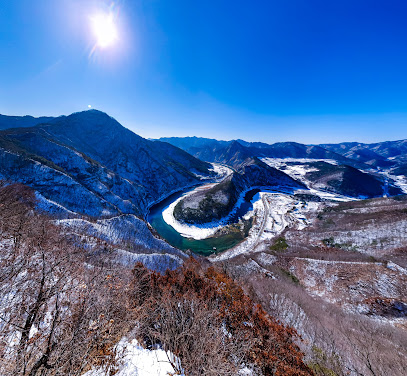
Sangwonsa
Discover the peaceful embrace of Sangwonsa, a beautiful Buddhist temple and hiking area offering stunning views and a chance for reflection in nature.
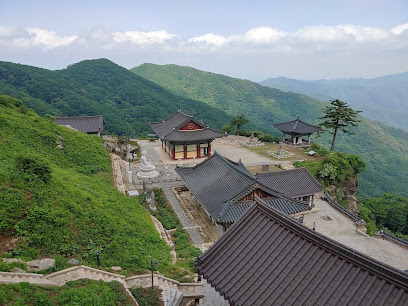
Gyeongpodae Pavilion
Discover the serene beauty and historical significance of Gyeongpodae Pavilion in Gangneung, a must-visit landmark along Korea's stunning coastline.
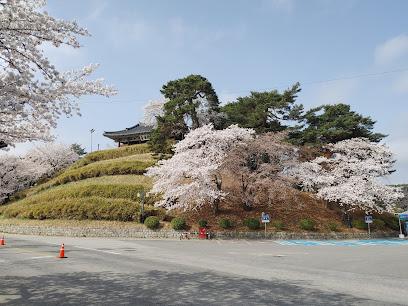
Ocean 700
Dive into fun and adventure at Ocean 700, Pyeongchang's premier water park with thrilling slides and relaxing pools for the whole family.
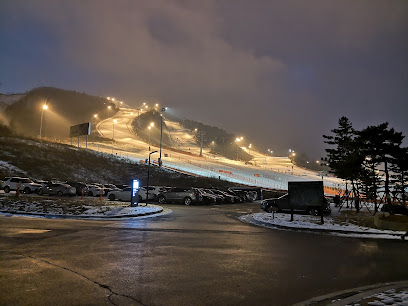
Mt.Balwangsan Cable Car
Discover breathtaking views and adventure at Mt. Balwangsan Cable Car in Pyeongchang-gun, Gangwon-do, where nature and thrill meet.
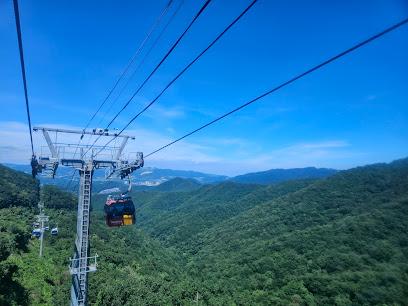
Balwangsan Cable Car
Experience breathtaking views and adventure at the Balwangsan Cable Car in Gangwon-do, a must-visit destination for nature lovers and thrill-seekers.
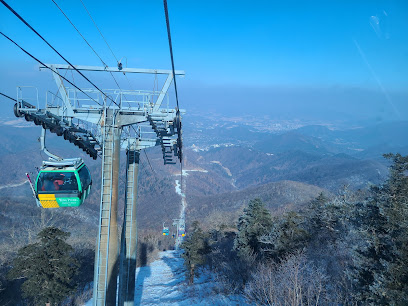
Museum of Youngwol Y Park
Discover the serene beauty of the Museum of Youngwol Y Park, where art meets nature in the heart of Gangwon-do, South Korea.
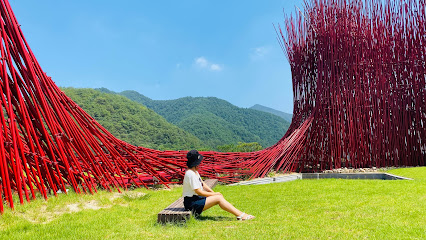
Auraji
Explore Auraji, a breathtaking tourist attraction in Gangwon-do, where nature and culture harmoniously blend for an unforgettable experience.
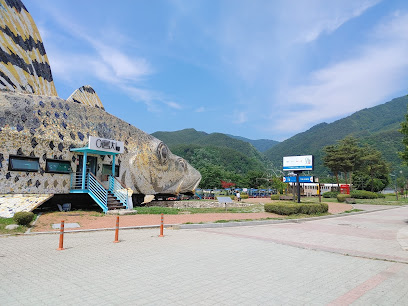
YongPyong Water park
Dive into excitement at YongPyong Water Park, where thrilling slides and relaxing pools await in the heart of Pyeongchang.
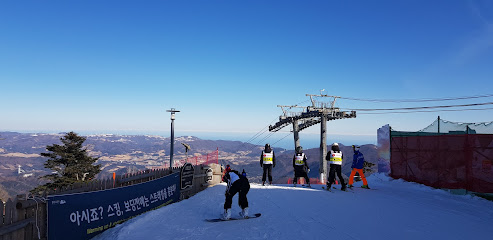
Phoenix Pyeongchang Resort
Discover the bliss of adventure and relaxation at Phoenix Pyeongchang Resort, a stunning getaway in the heart of South Korea's natural beauty.

Essential places to dine
Monapark Yong Pyong Ski Resort
Discover unparalleled skiing experiences at Monapark Yong Pyong Ski Resort—South Korea's premier winter wonderland nestled in Gangwon-do.

Phoenix Pyeongchang Hotel
Discover unparalleled luxury and adventure at Phoenix Pyeongchang Hotel - your gateway to skiing, golfing, and water fun in Gangwon-do.

Holiday Inn & Suites Alpensia Pyeongchang, an IHG Hotel
Discover unparalleled comfort and adventure at Holiday Inn & Suites Alpensia Pyeongchang – your gateway to winter sports and scenic beauty in Gangwon-do.
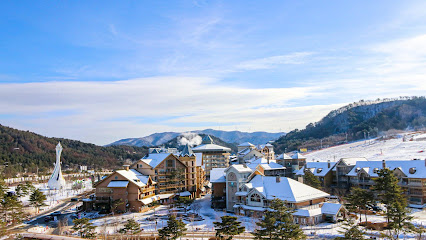
Hwangtae Hoegwan (Dried Pollack Restaurant)
Discover authentic Korean dining at Hwangtae Hoegwan in Pyeongchang-gun, where dried pollack takes center stage amidst beautiful surroundings.
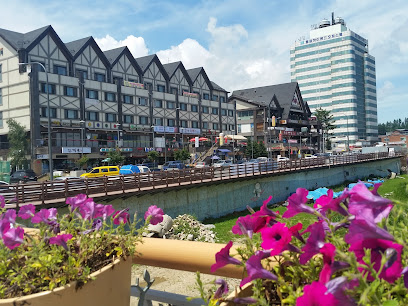
InterContinental Alpensia Pyeongchang Resort
Discover luxury and adventure at InterContinental Alpensia Pyeongchang Resort – your gateway to breathtaking landscapes and world-class amenities.
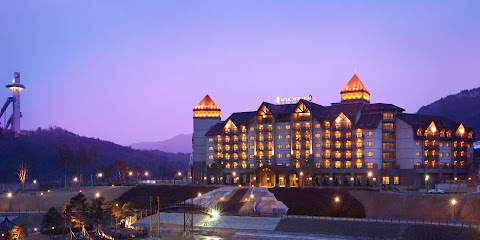
Hanwha Resort Pheonix Park
Experience luxury and adventure at Hanwha Resort Pheonix Park – your gateway to stunning landscapes and unforgettable outdoor activities.

RAMADA Hotel & Suites Gangwon PyeongChang
Discover unparalleled comfort at RAMADA Hotel & Suites in PyeongChang – your gateway to breathtaking landscapes and thrilling winter sports.

Pyeongchang Hanwoo Village Daegwallyeong Branch
Experience authentic Korean cuisine at Pyeongchang Hanwoo Village with exquisite Hanwoo beef surrounded by stunning landscapes.
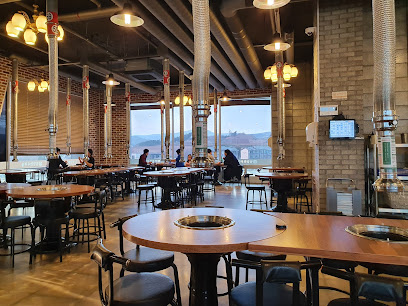
Migayeon
Experience authentic Korean flavors at Migayeon in Pyeongchang, renowned for its exquisite buckwheat dishes and welcoming atmosphere.
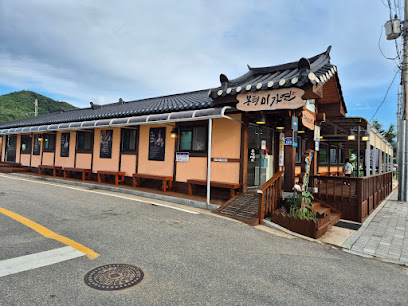
Alpensia Ski Resort
Discover thrilling skiing adventures at Alpensia Ski Resort in Pyeongchang - perfect for all winter sports lovers seeking breathtaking mountain views.
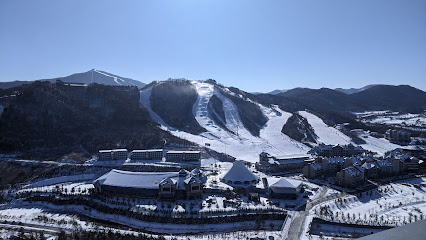
Buil Restaurant
Experience authentic Korean cuisine at Buil Restaurant in Pyeongchang - where tradition meets taste amidst stunning landscapes.
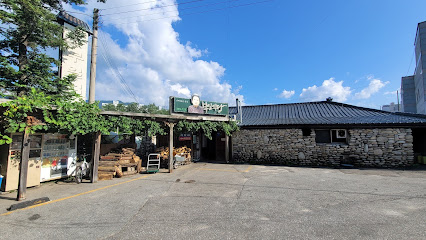
Dragon Valley Hotel - Yongpyeong Resort
Experience luxury and adventure at Dragon Valley Hotel - your gateway to year-round outdoor fun in Pyeongchang.

Phoenix Pyeongchang Resort
Discover luxury and adventure at Phoenix Pyeongchang Resort - your ultimate destination for skiing and relaxation in beautiful Gangwon-do.

Darae Korean Beef
Experience authentic Korean beef dishes at Darae Korean Beef in Pyeongchang-gun - a true culinary delight in Gangwon-do.
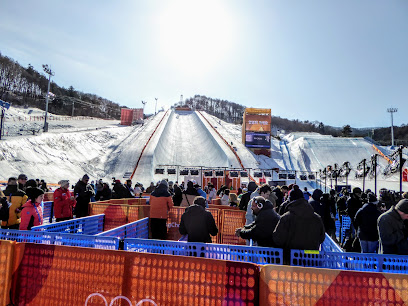
남경식당
Savor authentic Korean flavors at 남경식당 in Pyeongchang-gun – where every meal is a delightful culinary journey.
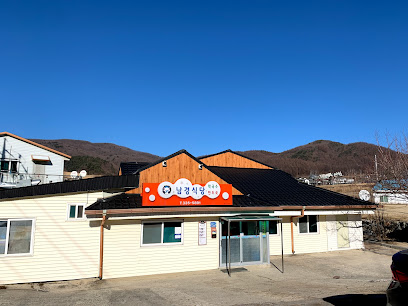
Markets, malls and hidden boutiques
Vivaldi Park
Experience the thrill of skiing in the stunning landscapes of Vivaldi Park, Gangwon-do, a premier resort for adventure and relaxation.
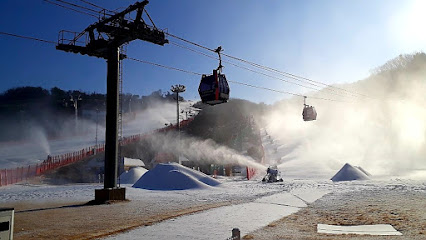
Monapark Yong Pyong Ski Resort
Experience the thrill of winter sports at Monapark Yong Pyong Ski Resort, South Korea's top destination for skiing and snowboarding.

Phoenix Pyeongchang Hotel
Discover the perfect blend of luxury and adventure at Phoenix Pyeongchang Hotel, featuring a ski resort, golf course, and water park in stunning Gangwon-do.

Daegwallyeong Sheep Farm
Experience the serene beauty of Daegwallyeong Sheep Farm, a picturesque ranch in Gangwon-do, where nature and tranquility converge.
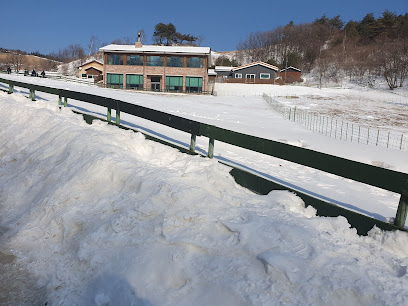
High1 Ski Resort
Discover the ultimate winter escape at High1 Ski Resort - South Korea's top destination for skiing and winter adventures in a stunning mountain setting.
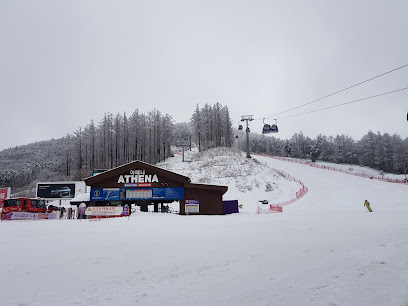
Lakai Sandpine Resort
Explore the serene beauty of Lakai Sandpine Resort, where luxury meets nature on the captivating shores of Gangwon-do.
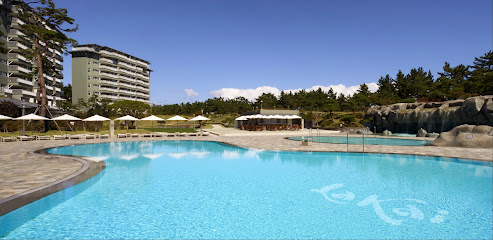
Holiday Inn & Suites Alpensia Pyeongchang, an IHG Hotel
Discover the perfect blend of comfort and adventure at Holiday Inn & Suites Alpensia Pyeongchang, your gateway to Korea's natural beauty.

Mona YongPyong - Tower Condominium
Discover luxury and adventure at Mona YongPyong - Tower Condominium, your perfect getaway in Pyeongchang's stunning landscapes.

InterContinental Alpensia Pyeongchang Resort
Discover unparalleled luxury and adventure at InterContinental Alpensia Pyeongchang Resort, your gateway to breathtaking mountain views and thrilling winter sports.
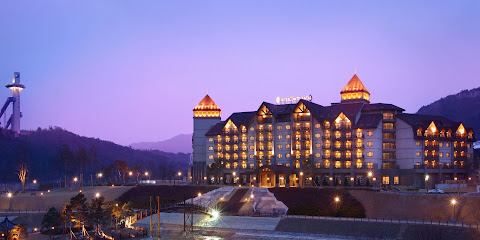
Hanwha Resort Pheonix Park
Experience year-round adventures and serene relaxation at Hanwha Resort Pheonix Park in the breathtaking Gangwon-do mountains.

Mona YongPyong - Greenpia Condominium
Discover the ultimate ski getaway at Mona YongPyong - Greenpia Condominium, where luxury meets adventure in the stunning landscapes of Pyeongchang.

Ocean 700
Experience the ultimate water adventure at Ocean 700 in Pyeongchang, where thrilling slides and family fun await amidst stunning natural beauty.
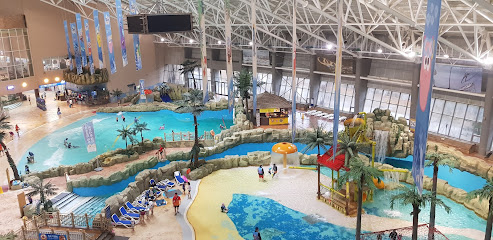
Alpensia Ski Resort
Experience the thrill of winter sports and the beauty of nature at Alpensia Ski Resort in Pyeongchang, South Korea.
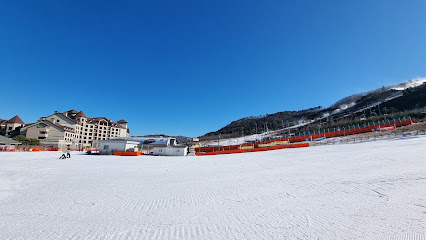
YongPyong Water park
Experience thrilling slides, relaxing pools, and stunning views at YongPyong Water Park, the ultimate summer destination in Gangwon-do, South Korea.
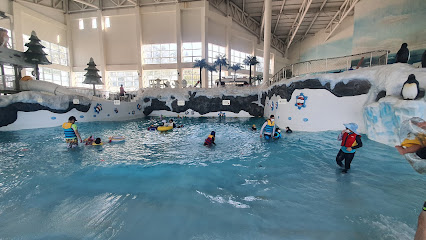
Mona YongPyong Dragon Valley Hotel
Discover the ultimate ski retreat at Mona YongPyong Dragon Valley Hotel, Korea's first ski resort, where adventure meets luxury in beautiful Gangwon-do.

Essential bars & hidden hideouts
Monapark Yong Pyong Ski Resort
Discover Monapark Yong Pyong Ski Resort, Korea's top winter destination with breathtaking slopes and exciting après-ski activities.

Phoenix Pyeongchang Hotel
Discover the ultimate blend of luxury and adventure at Phoenix Pyeongchang Hotel, where stunning landscapes meet world-class amenities.

Welli Hilli Park
Discover the thrill of skiing and the fun of water slides at Welli Hilli Park, a premier resort hotel in Gangwon-do, South Korea.

Lakai Sandpine Resort
Discover the elegance of Lakai Sandpine Resort, where luxury meets nature on the stunning beaches of Gangwon-do.
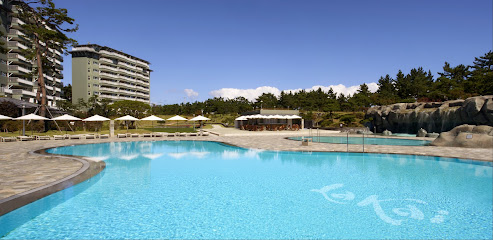
Holiday Inn & Suites Alpensia Pyeongchang, an IHG Hotel
Discover the perfect blend of comfort and adventure at Holiday Inn & Suites Alpensia Pyeongchang, a premier hotel in South Korea's stunning landscapes.
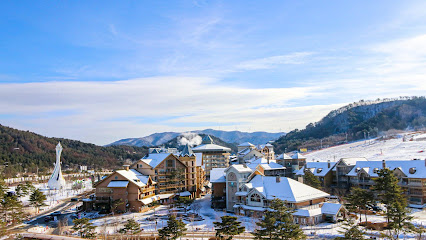
Hwangtae Hoegwan (Dried Pollack Restaurant)
Discover the authentic taste of Korea with exquisite dried pollack dishes at Hwangtae Hoegwan in Pyeongchang.
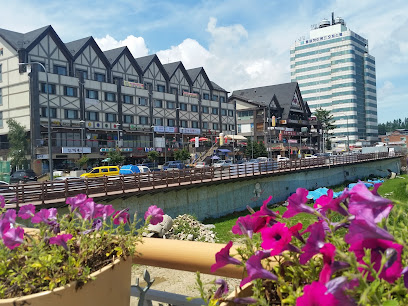
Mona YongPyong - Tower Condominium
Experience the perfect blend of luxury and adventure at Mona YongPyong, your ultimate resort hotel in Pyeongchang.

InterContinental Alpensia Pyeongchang Resort
Experience the ultimate luxury and adventure at InterContinental Alpensia Pyeongchang Resort, nestled in the breathtaking mountains of Gangwon-do.
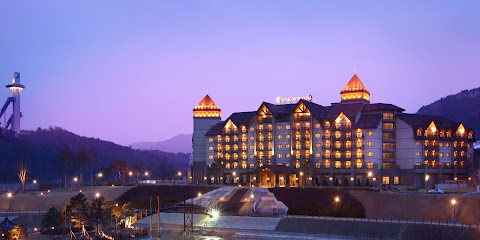
Hanwha Resort Pheonix Park
Discover the beauty and tranquility of Hanwha Resort Pheonix Park, your perfect getaway in the heart of Gangwon-do's stunning landscapes.

RAMADA Hotel & Suites Gangwon PyeongChang
Experience luxury and adventure at Ramada Hotel & Suites, the perfect base for exploring PyeongChang's stunning landscapes and ski resorts.

Ocean 700
Discover endless fun and adventure at Ocean 700, the ultimate water park in Pyeongchang-gun, Gangwon-do, perfect for families and thrill-seekers.
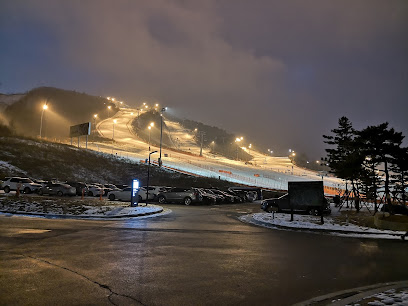
Alpensia Ski Resort
Experience the ultimate winter adventure at Alpensia Ski Resort, where pristine slopes and breathtaking views await in beautiful Pyeongchang.
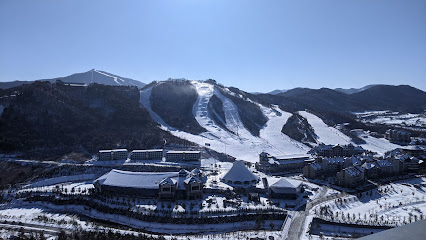
YongPyong Water park
Dive into a world of fun at YongPyong Water Park, where thrilling rides and serene pools await in the beautiful Pyeongchang region.
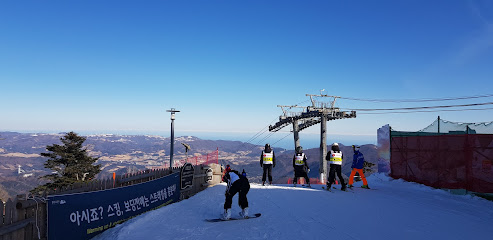
Peak Island
Experience the ultimate water park adventure at Peak Island, where thrilling slides and relaxing pools await in the heart of Gangwon-do.
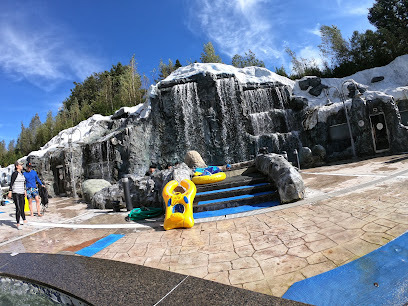
Local Phrases about Pyeongchang Ski Resorts
-
- Hello안녕하세요
[annyeonghaseyo] - Goodbye안녕히 가세요
[annyeonghi gaseyo] - Yes네
[ne] - No아니요
[aniyo] - Please/You're welcome부탁합니다/천만에요
[butakhamnida/cheonmaneyo] - Thank you감사합니다
[gamsahamnida] - Excuse me/Sorry죄송합니다/미안합니다
[joesonghamnida/mianhamnida] - How are you?어떻게 지내세요?
[eotteoke jinaeseyo?] - Fine. And you?잘 지내요. 그리고 당신은?
[jal jinaeyo. geurigo dangsineun?] - Do you speak English?영어 할 수 있어요?
[yeongeo hal su isseoyo?] - I don't understand이해하지 못해요
[ihaehaji mothaeyo]
- Hello안녕하세요
-
- I'd like to see the menu, please메뉴를 보여주세요
[menyureul boyeojuseyo] - I don't eat meat고기를 먹지 않아요
[gogireul meokji anayo] - Cheers!건배!
[geonbae!] - I would like to pay, please계산을 해주세요
[gyesan-eul haejuseyo]
- I'd like to see the menu, please메뉴를 보여주세요
-
- Help!도와주세요!
[dowajuseyo!] - Go away!가라주세요!
[galajuseyo!] - Call the Police!경찰을 불러주세요!
[gyeongchal-eul bulleojuseyo!] - Call a doctor!의사를 불러주세요!
[uisaleul bulleojuseyo!] - I'm lost길을 잃었어요
[gileul ilh-eoss-eoyo] - I'm ill아파요
[apayo]
- Help!도와주세요!
-
- I'd like to buy...사고 싶어요...
[sago sip-eoyo...] - I'm just looking둘러보고 있어요
[dulleobogo isseoyo] - How much is it?얼마에요?
[eolmaeyo?] - That's too expensive너무 비싸요
[neomu bissayo] - Can you lower the price?가격을 깎아줄 수 있어요?
[gageog-eul kkaj-ajul su isseoyo?]
- I'd like to buy...사고 싶어요...
-
- What time is it?지금 몇 시에요?
[jigeum myeoch sieyo?] - It's one o'clock한 시에요
[han sieyo] - Half past (10)10시 반
[sip si ban] - Morning아침
[achim] - Afternoon오후
[ohu] - Evening저녁
[jeonyeog] - Yesterday어제
[eoje] - Today오늘
[oneul] - Tomorrow내일
[naeil] - 1하나
[hana] - 2둘
[dul] - 3셋
[set] - 4넷
[net] - 5다섯
[daseot] - 6여섯
[yeoseot] - 7일곱
[ilgob] - 8여덟
[yeodeol] - 9아홉
[ahop] - 10열
[yeol]
- What time is it?지금 몇 시에요?
-
- Where's a/the...?...이 어디에 있어요?
[...i eodie isseoyo?] - What's the address?주소가 뭐에요?
[jusoga mwoeyo?] - Can you show me (on the map)?(지도에) 보여주세요
[(jido-e) boyeojuseyo] - When's the next (bus)?다음 (버스는) 언제와요?
[daeum (beoseuneun) eonjewayo?] - A ticket (to ....)(...으로) 표 하나 주세요
[(...eulo) pyo hana juseyo]
- Where's a/the...?...이 어디에 있어요?
History of Pyeongchang Ski Resorts
-
The history of skiing in Pyeongchang dates back to the late 20th century when the South Korean government began to invest in winter sports infrastructure. The first ski resort, Yongpyong Resort, was established in 1975. It quickly became a popular destination for local and international skiers, thanks to its pristine slopes and modern facilities.
-
Pyeongchang gained international recognition when it hosted the 1999 Asian Winter Games. The event showcased the region's capability to host large-scale winter sports competitions and highlighted its potential as a future Olympic venue. This event marked a significant milestone in the development of winter sports in South Korea.
-
Pyeongchang made three consecutive bids to host the Winter Olympics, in 2010, 2014, and 2018. Although the bids for 2010 and 2014 were unsuccessful, the efforts helped to significantly improve the region's infrastructure and international profile. The successful bid for the 2018 Winter Olympics was announced on July 6, 2011, in Durban, South Africa.
-
The 2018 Winter Olympics, held from February 9 to 25, marked a historic moment for Pyeongchang. The event brought together athletes from around the world to compete in various winter sports. The Alpensia Resort served as the main venue, featuring state-of-the-art facilities such as the Alpensia Ski Jumping Centre, Alpensia Biathlon Centre, and Alpensia Cross-Country Centre.
-
Pyeongchang is not only known for its winter sports but also for its rich cultural heritage. The region is home to several historical sites, including the Woljeongsa Temple, which dates back to the 7th century. The temple is a significant cultural landmark and offers visitors a glimpse into South Korea's Buddhist traditions and history.
-
In preparation for the 2018 Winter Olympics, Pyeongchang focused on environmental sustainability. Efforts included the development of eco-friendly infrastructure and the preservation of natural landscapes. These initiatives have helped to maintain Pyeongchang's status as a pristine winter sports destination while promoting sustainable tourism practices.
Pyeongchang Ski Resorts Essentials
-
Pyeongchang Ski Resorts are located in Gangwon Province, South Korea. The nearest international airport is Incheon International Airport in Seoul, approximately 180 kilometers away. From Seoul, you can take a high-speed KTX train from Seoul Station to Jinbu Station, which takes about 1.5 hours. Alternatively, you can take an express bus from Dong Seoul Bus Terminal to Pyeongchang, which takes around 2.5 hours. Car rentals and shuttle services are also available for more direct travel.
-
Within Pyeongchang, local buses and taxis are the primary modes of transportation. Shuttle buses are available to transport visitors between the major ski resorts such as Alpensia, Yongpyong, and Phoenix Park. Renting a car can provide flexibility, but be aware of winter driving conditions. For those staying at resort accommodations, many offer complimentary shuttle services to and from the slopes.
-
The official currency of South Korea is the South Korean Won (KRW). Credit cards are widely accepted at hotels, restaurants, and larger shops. However, it's advisable to carry some cash for smaller businesses and rural areas. ATMs are available in major ski resorts and towns, but ensure your card is compatible with Korean ATMs. Currency exchange services are available at the airport and major banks.
-
Pyeongchang is generally a safe destination for tourists. Crime rates are low, but standard precautions should always be taken. Avoid leaving belongings unattended and be cautious of pickpockets in crowded areas. There are no specific high-crime areas targeting tourists, but it is always wise to stay vigilant and aware of your surroundings.
-
In case of emergency, dial 112 for police assistance and 119 for fire and medical emergencies. Major ski resorts have medical facilities and first aid stations on-site. It is recommended to have travel insurance that covers medical emergencies. Local hospitals and clinics are available in Pyeongchang for more serious health issues.
-
Fashion: Do dress warmly and in layers for cold weather. Avoid overly revealing clothing. Religion: Do respect local customs and traditions. Public Transport: Do be respectful and give up your seat to elderly passengers. Don't eat or drink on public transport. Greetings: Do greet people with a bow or a handshake. A slight bow is a sign of respect. Eating & Drinking: Do try local delicacies and accept food offerings graciously. Don't refuse hospitality, as it is considered impolite.
-
To experience Pyeongchang like a local, visit local markets and try traditional Korean dishes such as bibimbap and kimchi. Engage with locals, who are often friendly and willing to share stories about the area. Don't miss visiting the nearby attractions such as the Odaesan National Park and the Woljeongsa Temple. For a unique experience, try a jjimjilbang (Korean sauna) after a day on the slopes.
Trending Landmarks in Pyeongchang Ski Resorts
-
Monapark Yong Pyong Ski Resort
-
Phoenix Pyeongchang Hotel
-
Holiday Inn & Suites Alpensia Pyeongchang, an IHG Hotel
-
InterContinental Alpensia Pyeongchang Resort
-
Hanwha Resort Pheonix Park
-
RAMADA Hotel & Suites Gangwon PyeongChang
-
Alpensia Ski Resort
-
Dragon Valley Hotel - Yongpyeong Resort
-
Phoenix Pyeongchang Resort
-
Odaesan National Park
-
Bliss Hill Stay - Yongpyeong Resort
-
Yongpyeong Ski Resort
-
Phoenix Pyeongchang Snow Park
-
Hoengseong Welli Hilli Park Ski Resort
-
레인보우 3











